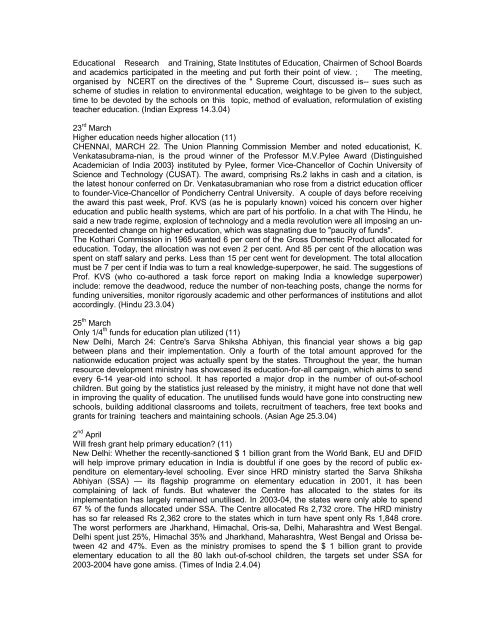EDUCATION - 2004 - Indian Social Institute
EDUCATION - 2004 - Indian Social Institute
EDUCATION - 2004 - Indian Social Institute
You also want an ePaper? Increase the reach of your titles
YUMPU automatically turns print PDFs into web optimized ePapers that Google loves.
Educational Research and Training, State <strong>Institute</strong>s of Education, Chairmen of School Boards<br />
and academics participated in the meeting and put forth their point of view. ; The meeting,<br />
organised by NCERT on the directives of the " Supreme Court, discussed is-- sues such as<br />
scheme of studies in relation to environmental education, weightage to be given to the subject,<br />
time to be devoted by the schools on this topic, method of evaluation, reformulation of existing<br />
teacher education. (<strong>Indian</strong> Express 14.3.04)<br />
23 rd March<br />
Higher education needs higher allocation (11)<br />
CHENNAI, MARCH 22. The Union Planning Commission Member and noted educationist, K.<br />
Venkatasubrama-nian, is the proud winner of the Professor M.V.Pylee Award (Distinguished<br />
Academician of India 2003} instituted by Pylee, former Vice-Chancellor of Cochin University of<br />
Science and Technology (CUSAT). The award, comprising Rs.2 lakhs in cash and a citation, is<br />
the latest honour conferred on Dr. Venkatasubramanian who rose from a district education officer<br />
to founder-Vice-Chancellor of Pondicherry Central University. A couple of days before receiving<br />
the award this past week, Prof. KVS (as he is popularly known) voiced his concern over higher<br />
education and public health systems, which are part of his portfolio. In a chat with The Hindu, he<br />
said a new trade regime, explosion of technology and a media revolution were all imposing an unprecedented<br />
change on higher education, which was stagnating due to "paucity of funds".<br />
The Kothari Commission in 1965 wanted 6 per cent of the Gross Domestic Product allocated for<br />
education. Today, the allocation was not even 2 per cent. And 85 per cent of the allocation was<br />
spent on staff salary and perks. Less than 15 per cent went for development. The total allocation<br />
must be 7 per cent if India was to turn a real knowledge-superpower, he said. The suggestions of<br />
Prof. KVS (who co-authored a task force report on making India a knowledge superpower)<br />
include: remove the deadwood, reduce the number of non-teaching posts, change the norms for<br />
funding universities, monitor rigorously academic and other performances of institutions and allot<br />
accordingly. (Hindu 23.3.04)<br />
25 th March<br />
Only 1/4 th funds for education plan utilized (11)<br />
New Delhi, March 24: Centre's Sarva Shiksha Abhiyan, this financial year shows a big gap<br />
between plans and their implementation. Only a fourth of the total amount approved for the<br />
nationwide education project was actually spent by the states. Throughout the year, the human<br />
resource development ministry has showcased its education-for-all campaign, which aims to send<br />
every 6-14 year-old into school. It has reported a major drop in the number of out-of-school<br />
children. But going by the statistics just released by the ministry, it might have not done that well<br />
in improving the quality of education. The unutilised funds would have gone into constructing new<br />
schools, building additional classrooms and toilets, recruitment of teachers, free text books and<br />
grants for training teachers and maintaining schools. (Asian Age 25.3.04)<br />
2 nd April<br />
Will fresh grant help primary education? (11)<br />
New Delhi: Whether the recently-sanctioned $ 1 billion grant from the World Bank, EU and DFID<br />
will help improve primary education in India is doubtful if one goes by the record of public expenditure<br />
on elementary-level schooling. Ever since HRD ministry started the Sarva Shiksha<br />
Abhiyan (SSA) — its flagship programme on elementary education in 2001, it has been<br />
complaining of lack of funds. But whatever the Centre has allocated to the states for its<br />
implementation has largely remained unutilised. In 2003-04, the states were only able to spend<br />
67 % of the funds allocated under SSA. The Centre allocated Rs 2,732 crore. The HRD ministry<br />
has so far released Rs 2,362 crore to the states which in turn have spent only Rs 1,848 crore.<br />
The worst performers are Jharkhand, Himachal, Oris-sa, Delhi, Maharashtra and West Bengal.<br />
Delhi spent just 25%, Himachal 35% and Jharkhand, Maharashtra, West Bengal and Orissa between<br />
42 and 47%. Even as the ministry promises to spend the $ 1 billion grant to provide<br />
elementary education to all the 80 lakh out-of-school children, the targets set under SSA for<br />
2003-<strong>2004</strong> have gone amiss. (Times of India 2.4.04)

















